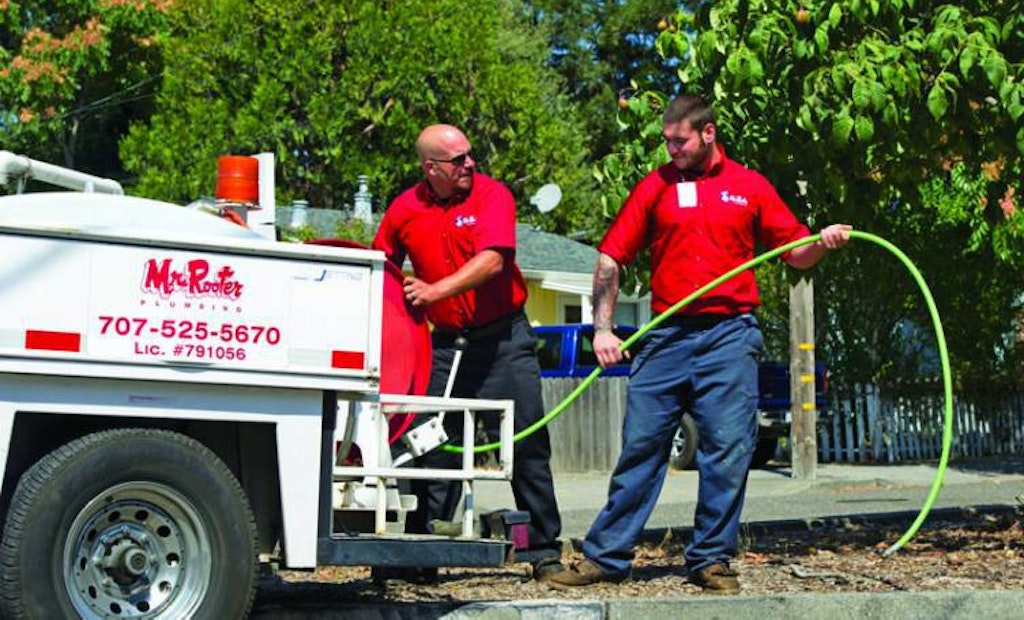
Interested in Plumbing?
Get Plumbing articles, news and videos right in your inbox! Sign up now.
Plumbing + Get AlertsIf you’re a service plumber hankering to strike out on your own — or if you already have, but need some help stabilizing the business — you have an alternative to flying solo: franchising.
Signing up with a franchisor will cost you something, typically a five- to six-figure startup fee and then regular royalties that come out of your cash flow. But franchisors argue — and satisfied franchisees agree — that if it’s a good fit, the benefits are more than worth the cost of signing up.
Benefit No. 1 is the brand. “There used to be a drugstore on every corner,” says Donald MacDonald, founder and CEO of the Rooter-Man franchise system headquartered in Massachusetts. “Today, they’re all Walgreens, CVS or other major brands.”
He believes the same is coming true for service businesses. “Consumers feel more comfortable doing business with a national brand,” MacDonald says. They put some faith in universal standards that national franchisors set for their operations, and at least some believe that when things go wrong, a big name brand can be more easily held accountable than a one-person shop with a voice mailbox that’s always full.
But brand recognition is just the beginning. Franchise organizations have developed systems to manage all aspects of the business: marketing and drawing in new customers; human resource management and making good leadership decisions; and financial management to keep profits healthy and expenses in check.
And that’s where the big benefits may be found.
“There’s kind of a simple truth you see in plumbing,” says Sam Thurman, vice president of franchise development for Mr. Rooter Plumbing, part of the Dwyer Group. “The vast majority of owners and future owners you’ll see in the plumbing business are plumbers” – and possibly very good ones. But that alone won’t ensure their success. “When they get into business for themselves, they’re confronted with a whole array of things they have to become good at as well.”
Franchisors say that is what they bring to the table for the franchisee. “We can help them raise their revenues, we can help them get more efficient in what they do, and we can help them monitor and reduce costs in many different ways,” says Jeff Moody, vice president of operations for bluefrog Plumbing + Drain based in Arizona and part of the Home Brands Group.
William White, owner of bluefrog franchises in Dallas and Fort Worth, Texas, agrees.
“The benefit of a franchise is a good solid business model,” White says. He likes the overall culture of his franchisor and also values the network of preferred suppliers he’s gotten through the relationship. With support like that in all aspects of the business, he says, “I don’t mind paying the weekly royalty fee.”
When a franchisee runs into a tough spot, help doesn’t just come from the home office; it can come from fellow franchisees. “In a franchise system, people are willing to share information,” Moody says. “They’re not competing with each other.”
People in drain cleaning and related service plumbing work have several franchise options to choose from. At the same time, each has its own particular outlook and culture when it comes to doing business. The prospective franchisee will want to look closely at how they differ instead of assuming that when you’ve seen one, you’ve seen ‘em all.
Many new franchisees are already experienced in the core trade; bluefrog, for example, puts a lot of its recruiting emphasis on the “man in a van,” says Moody — the sole proprietor plumber or drain cleaner.
“The vast majority of companies out there that become a part of the Mr. Rooter franchise are already in business,” adds Thurman. As independent businesses, they might have made anywhere from $100,000 in revenues a year to more than $1 million, he says.
Franchisors will welcome serious inquiries from people who don’t have specific trade experience if they can show evidence that they’re capable of running the business. White got his bluefrog franchise after several years of owning another franchise specializing in housecleaning, which he still runs.
For the up-front fee, prospective franchisees can often arrange financing through the Small Business Administration and some other specialized programs. So while having saved adequate capital for a down payment is important, you don’t have to be wealthy to buy in.
Franchisors emphasize that they look for integrity, basic business acumen, a fit with their organization’s particular culture, and the willingness to set ambitious but achievable goals and then work hard to reach them.
Franchising isn’t for everyone, though. “Franchises need to be awarded, not sold,” says MacDonald — and both the franchisor and prospective franchisees need to look each other over closely to make sure it’s a good fit.
“Not everybody is a team player. Not everybody can sit back and follow a system,” MacDonald says. Some people simply prefer to do it their own way.
While some people may thrive on getting to use that sort of creativity, it would likely cause problems in the franchise environment, he adds. “If a franchise takes someone on like that, it’s not going to be good for either one of them.”
If you're serious about starting a new plumbing and drain cleaning business, check out "7 Awesome Franchise Opportunities For Drain Cleaners."





